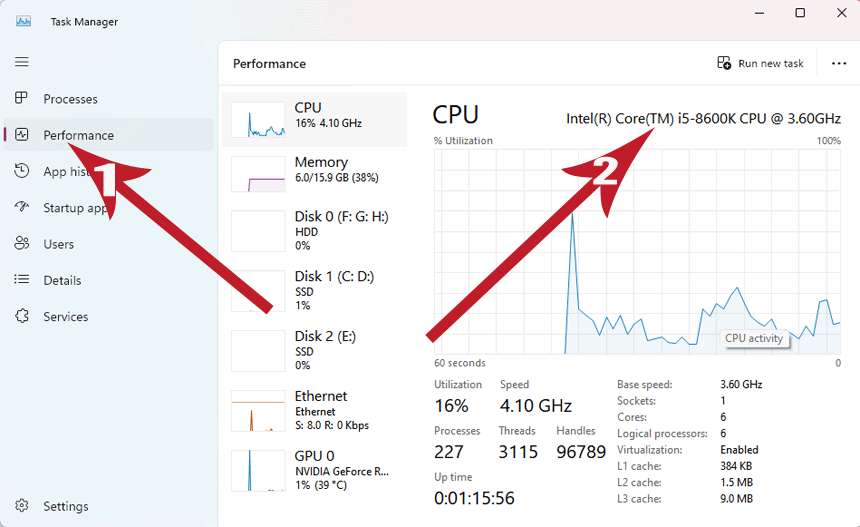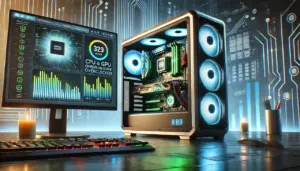In the ever-churning tech world, where new gadgets flash by like fireflies on a summer night, a crucial question arises: Does the CPU generation truly matter, or is it just a clever marketing strategy? As we witness new CPU generations appearing regularly, the question of their actual significance becomes increasingly relevant. Let’s slow down for a moment and ask: do all those CPU generations really make a difference, or is it just fancy talk to sell more gadgets? Let’s break it down.
Quick Links
What Are CPU Generations?
Think of CPU generations like different versions in a series. They share a bunch of important stuff, like how they’re built, their features, and when they hit the market. When big companies like Intel talk about “13th gen” or “14th gen” processors, or AMD throws around “5000 Series” and “7000 Series,” they’re talking about different generations. Oh, and when you see Intel Core CPUs like Core 3 and 5, or AMD Ryzen CPUs like Ryzen 3 and 5, those are more about performance than being a whole new generation.
The Link Between CPU Generation and Performance Features
So, do newer generations mean better performance? Well, kinda. Usually, a newer generation of CPU is better than the old one, but not always by a lot. Sometimes it’s like getting a fancier version of the same thing. For example, the 14th gen Intel CPU Core lineup is just a slightly upgraded version of the 13th gen. On the flip side, the Ryzen 7000 Series is like the superhero upgrade, bringing a 10–30% boost compared to the Ryzen 5000 Series.
Related: Understanding: Cores vs Threads, Hyper-Threading, and More.
Cool Tech Stuff in Newer CPU Generations
Let’s simplify the CPU generation game. Imagine CPUs as families, and each new generation is like a new set of siblings with some cool upgrades. Here’s what those upgrades usually involve:
- Faster clock speeds: This is like the CPU’s heartbeat. The faster it beats, the quicker it gets tasks done.
- More cores and threads: Think of these as the CPU’s arms and legs. Having more of them means the CPU can handle multiple things at the same time. It’s great for multitasking, especially for heavy-duty tasks like gaming and video editing.
- Architectural upgrades: Each new generation often brings improvements to the design and technology inside the CPU. It’s like giving the brain of your computer a fancy tune-up, making it more efficient with power, memory, and processing instructions.
Besides performing better, new CPU generations also bring in some cool tech. We’re talking better security, saving energy, supporting fancier RAM (DDR5), super-fast data transfer (PCIe 5.0), and even improved graphics.
Spotting Your CPU Generation

Figuring out which generation your CPU belongs to isn’t rocket science. Look at the first number in its name – that’s the generation. For example, Intel Core i5-8600K belongs to the 8th generation. If you’re still not sure, check the CPU model on the maker’s website or peek into your computer settings using the Task Manager.
Should You Always Go for the Latest Generation?
Here’s the real talk: you don’t have to jump on every new CPU bandwagon. For most folks, the differences between generations won’t blow your socks off. Upgrade when your computer feels outdated, and your CPU is struggling. Maybe you want to play the latest games, run fancy work programs, or just stay ahead in the tech game – that’s when upgrading makes sense.
Should you rush to upgrade your computer? Well, it depends. Here’s a simple guide:
- Upgrade if you’re a power user: If you love gaming, edit videos a lot, or just want the latest and greatest, getting a new CPU can make a big difference. You’ll enjoy smoother gaming, quicker video editing, and can show off having the latest tech.
- Wait if your computer is doing fine: If your current CPU handles your everyday tasks well and you’re on a tight budget, don’t stress. You can hold off on upgrading until it’s really necessary.
- Do some research before deciding: Before making a decision, do a bit of research. Look at benchmarks and read reviews to find the best balance between performance and price that suits your needs.
What to Think About When Upgrading
If you’re thinking about upgrading, be ready to possibly buy a new motherboard and memory. New CPU generations sometimes come with a new socket, and that can make your old motherboard useless. So, check if your motherboard is cool with the new CPU or if you need to do a bigger upgrade.
Conclusion
New computer parts come out all the time, and CPUs are no different. While these newer versions are usually faster and have cooler features, you don’t always need the very latest one. The best choice for you depends on what you actually use your computer for and how much you’re willing to spend. Knowing what generation your CPU belongs to helps you make informed decisions about upgrades and stay on top of things, but it doesn’t mean you have to rush out and buy the newest one.
When you purchase through links on our site, we may earn an affiliate commission. Read our Affiliate Policy.





